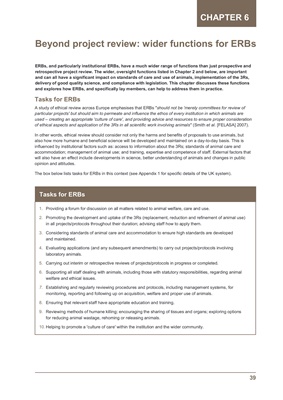
39
CHAPTER 6
Beyond project review: wider functions for ERBs
ERBs, and particularly institutional ERBs, have a much wider range of functions than just prospective and
retrospective project review. The wider, oversight functions listed in Chapter 2 and below, are important
and can all have a significant impact on standards of care and use of animals, implementation of the 3Rs,
delivery of good quality science, and compliance with legislation. This chapter discusses these functions
and explores how ERBs, and specifically lay members, can help to address them in practice.
Tasks for ERBs
A study of ethical review across Europe emphasises that ERBs "should not be 'merely committees for review of
particular projects' but should aim to permeate and influence the ethos of every institution in which animals are
used - creating an appropriate 'culture of care', and providing advice and resources to ensure proper consideration
of ethical aspects and application of the 3Rs in all scientific work involving animals" (Smith et al. [FELASA] 2007).
In other words, ethical review should consider not only the harms and benefits of proposals to use animals, but
also how more humane and beneficial science will be developed and maintained on a day-to-day basis. This is
influenced by institutional factors such as: access to information about the 3Rs; standards of animal care and
accommodation; management of animal use; and training, expertise and competence of staff. External factors that
will also have an effect include developments in science, better understanding of animals and changes in public
opinion and attitudes.
The box below lists tasks for ERBs in this context (see Appendix 1 for specific details of the UK system).
Tasks for ERBs
1. Providing a forum for discussion on all matters related to animal welfare, care and use.
2. Promoting the development and uptake of the 3Rs (replacement, reduction and refinement of animal use)
in all projects/protocols throughout their duration; advising staff how to apply them.
3. Considering standards of animal care and accommodation to ensure high standards are developed
and maintained.
4. Evaluating applications (and any subsequent amendments) to carry out projects/protocols involving
laboratory animals.
5. Carrying out interim or retrospective reviews of projects/protocols in progress or completed.
6. Supporting all staff dealing with animals, including those with statutory responsibilities, regarding animal
welfare and ethical issues.
7. Establishing and regularly reviewing procedures and protocols, including management systems, for
monitoring, reporting and following up on acquisition, welfare and proper use of animals.
8. Ensuring that relevant staff have appropriate education and training.
9. Reviewing methods of humane killing; encouraging the sharing of tissues and organs; exploring options
for reducing animal wastage, rehoming or releasing animals.
10. Helping to promote a 'culture of care' within the institution and the wider community.